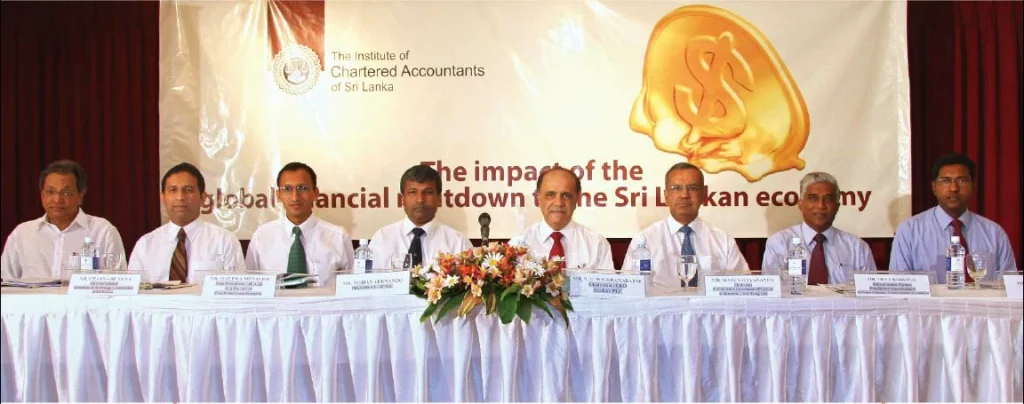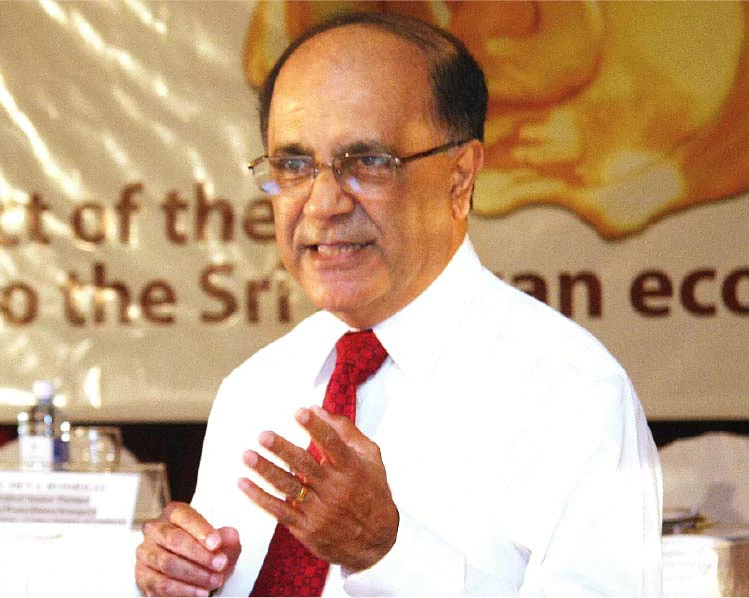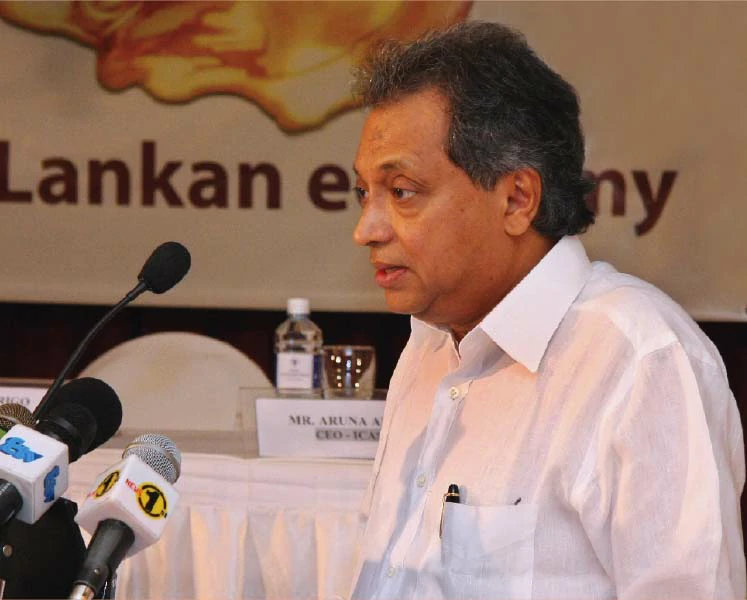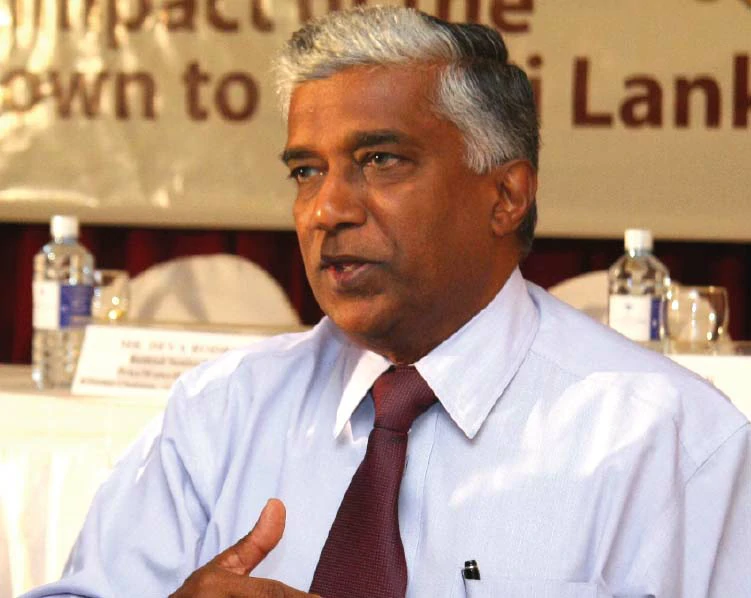
The current global financial slowdown did not happen out of the blue; many saw it coming. But it was only in September 2008, when many global banks and other financial institutions in the United States were merged or failed that it became a prominent issue in the world. The effect of this slowdown is invariably felt in Sri Lanka as well, primarily because of our trade relations with the USA and other major European markets. At a recent seminar organised by the Institute of Chartered Accountants of Sri Lanka (ICASL), an eminent panel discussed the possible impact of the global economic meltdown on the Sri Lankan economy.
Compiled by- Thilini Kahandawaarachchi
In 2009, the Institute of Chartered Accountants of Sri Lanka (ICASL) steps into its 50th year. For half a century, the ICASL has played a major role in developing the accounting culture in Sri Lanka through accounting standards, various guidelines, manuals, auditing standards etc. President of the ICASL, Nishan Fernando said that the seminar titled “the impact of the global financial meltdown to the Sri Lankan economy” was organised as a response to the numerous inquiries made by the media, on the background, the history and how the current global credit crunch would impact the Sri Lankan economy.
Vice President of the ICASL and a Partner of Pricewaterhouse Coopers, Sujeewa Mudalige commenced the seminar by presenting a brief overview of the global financial meltdown. Tracing how the credit crunch that started off in the US spread all over the world, he stated that no country would be immune to this global slowdown and quoted George Soros’ words, “the current financial crisis is less likely to cause a global recession than a radical realignment of the global economy, with a relative decline of the US and the rise of China and other countries in the developing world.”
Highlighting the importance of the US economy, which is worth US$13 trillion, Mudalige mentioned that it is actually a multiple of all the big economies in the world. Thus, whatever that happens in the US has a direct impact across the globe because everyone has some kind of trading transaction with the US. He noted that if all the stock market values (the market caps) are put together, at 44% the US market accounts for a significant value of all stock markets around the world. Therefore, it is no wonder that the markets all over the world are very sensitive to the volatility of the US stock markets. With 62.5% global reserves held in US dollars, it has a huge impact on the currency markets and the world economy.
Since World War II, many countries have had a lot of easy money leading to higher consumer spending, better lives and more disposable income, which has in turn resulted in a huge amount of debt. Over the last ten years, there has been a significant rise in debt. Beginning in 2002, a combination of record-low borrowing rates, record-high margins for lenders and investor appetite led to a significant expansion in the housing sector. Many people who did not have the capacity to repay and who should not have been given these loans, who are referred to as sub prime borrowers, were also granted housing loans. So, when the interest rates began a sharp rise around 2004, people could not pay back, which gradually resulted in the failure of those lending companies. The catalyst of the current financial turmoil has been the losses on the subprime mortgage market.
Around the same time, the big banks also started borrowing heavily and in the years 2003 to 2007, commercial banks and investment banks started leveraging a huge amount of money with a very small capital causing them to be heavily indebted. Regulators all over the globe allowed such leveraging to take place since at that time, the balance sheets were strong, companies were recording impressive results, property prices were high and stock markets were doing well. However, when the housing prices declined and the markets came down, there was not enough capital to absorb it. The only way to survive was either to re-capitalise by raising more cash or to seek recourse at their Central Bank or close down, and that was exactly what happened to many big banks.
In 2009, Countries Such As China, Japan And Russia Along With The Middle Eastern Countries Who Have Significant Reserves Will Call The Shots In The Short Term And May Even Come Forward To Bail Out Countries Who Declare Bankruptcy – Sujeewa Mudalige, Vice President, ICASL, Partner, Pricewaterhouse Coopers
Many companies had false assets. Complex and sophisticated paper instruments were invented. For instance, the value of Credit Default Swaps (CDSs) outstanding was almost US$55 trillion which was higher than the value of the global GDP. Rating companies gave junk ratings to these instruments. Ultimately when disaster struck, in order to mitigate the adverse consequences that could result from the failure of big finance institutions, many banks were nationalised or taken over, yet some could not be saved and had to be declared bankrupt. Compared to the Asian Banking crisis and the Japanese crisis, the present global financial crisis is much bigger and its impact, much severe. Realising the gravity of this problem the UK treasury gave bail out packages to all the big banks as they were too big to fall. The failure of these big banks would have been catastrophic for the UK economy. So eight large banks were identified and now they are queuing up for bailout.
When one looks at the outcome of this crisis, one cannot ignore the fact that it has had a huge blow on stakeholder confidence. Investment banks are no more and they have converted themselves to bank holding companies thus changing the face of Wall Street forever. We have reached a stage where the definition of capitalism is seriously questioned. Many countries are introducing new regulations, there are critical cuts on executive salaries and there have been massive loss of jobs. In the US alone 2.6 million people have lost their jobs leading to the highest ever job losses in the last 15-20 years.
All over the world stock markets and commodity prices are crashing. We in Sri Lanka feel the crunch as prices of our key exports have decreased and tourist arrivals are affected. There is a global slowdown and big economies are going into recession. Mudalige forecasts a tough twenty-four months ahead and opines that in 2009, countries such as China, Japan and Russia along with the Middle Eastern countries who have significant reserves will call the shots in the short term and may even come forward to bail out countries who declare bankruptcy.
Speaking on the impact of this global crisis on the export industry in Sri Lanka, N G Wickremaratne, Chairman and CEO of Hayleys Group emphasised that its impact on Sri Lanka will come primarily by the negative sentiment, which will have the effect of making people postpone consumption. People and institutions have become hugely suspicious of investing, making deposits and lending to each other while large number of job losses in industries across the globe has added to the sense of uncertainty and diminished the purchasing power of people. Thus, it has created a vicious spiral and loss of confidence, which feeds on itself.
As demand for our export products reduces, the primary channel that would bring the crisis home to Sri Lanka would be trade. Sri Lanka’s exposure to high-risk financial assets have been very little thanks to a strict regulatory environment in Sri Lanka and therefore an impact via the collapse of financial institutions seems unlikely. However trade finance has been affected with reduced liquidity. The impact on trade will be significant as nearly 80% of our exports will be affected by recession in consuming markets. Tea perhaps is one export that is likely to be recession proof. Apparel exports, (which account for 43% of our exports), along with rubber products, ceramic products and leather & machinery and equipment, diamonds and gems all account for nearly 80% of exports and are discretionary items, thus being highly vulnerable to recessionary pressure.
Noting that Hayleys, which produces a variety of export goods, is an apt barometer of the Sri Lankan economy, Wickremaratne explained that the product range of Sri Lanka’s exports coupled with the fact that the state of the key destinations -the EU and the USA which are already in severe recession, makes our exports increasingly vulnerable.
Sri Lanka’s Exposure To High Risk Financial Assets Have Been Very Little Thanks To A Strict Regulatory Environment In Sri Lanka And Therefore An Impact Via The Collapse Of Financial Institutions Seems Unlikely – N G Wickremaratne, Chairman & CEO, Hayleys Group
He highlighted the importance of finding a way to promote our exports and said that we have to be prepared for the problems that we might face in the future. He also explained that the manufacturers for the global market like Hayleys have had to face this crisis period in a weaker state than their competitors or partners in other countries have had to, due to a scenario of high inflation and the resultant appreciation of the exchange rate in real terms that was inimical to exports. Speaking of various strategies, which can be adopted to weather this difficult time he mentioned that it is wages that are mostly affected by inflation, so, in a scenario of no depreciation the only alternative is to enforce wage cuts. For that, it is important that our workforce understands the problem. He pointed out the importance of creating awareness of Trade Unions because in the long run it is this mutual understanding that would help save jobs.
Noting that Sri Lankan exporters have been pushing the Government to reduce energy prices and seeking lower interest rates, Wickremaratne observed that though relaxation of the exchange rate would definitely help, it is also important to look at alternative solutions.
Discussing the impact of the global financial meltdown on the apparel sector in detail, Chairman of the Joint Apparel Association Forum (JAAF) Ajith Dias stated that the US$3.2 billion export business is the largest contributor to our economy and it directly employs about 270,000 people whilst another 750,000 are involved in the apparel industry. He noted that in the 90’s the apparel industry grew by about a minimum of 10% a year, and though reaching US$3.2 billion in 2007 was a formidable performance, it is below the target which has been set for the industry.
With a highly competitive workforce and an emphasis on innovation, the sector has developed into a sophisticated industry in the past three and a half decades. Various types of factories and processes have been set up which have contributed to value addition. Noting that the “Garments Without Guilt” campaign has gone very far in positioning Sri Lanka very strongly in the GSP+ scheme, he observed that the campaign has been welcome, especially in the US and Europe.
Speaking of the present position of GSP+, he mentioned that up to February 18, 2009 the EU would entertain submissions from anyone regarding GSP+ and Sri Lanka, after which they will review the submissions and make recommendations to the Council. Even if the outcome is negative, Sri Lanka will be given 6 months notice, which would allow business to continue until the end of the year. So, it is yet to be seen whether the investors would continue or move elsewhere. Mentioning that GSP+ affects several other trades he pointed out that in fact, some industries have benefited more from GSP+ than the apparel sector itself.
Drawing attention to various issues faced by the apparel industry, he stated that it is important to adjust utility costs because textile mills consume a lot of electricity and their costs are very high. These high expenses do not encourage other industries (especially the textile trade) to come and set up in Sri Lanka. He also mentioned that the survival of Small and Medium Exports Industries is one of the biggest issues in the industry as there are no more than 200 garment factories that produce for exports. The numbers are dwindling and it is a challenge to see whether they will merge with bigger factories or not.
Noting that the Government has announced a stimulus package, he mentioned that though it is not the final blue print, the only criteria that the Government should look at when providing the 5% stimulus package is employment, because the biggest problem the country is going to face with the downturn of industry is layoff of work force. He expressed his hope that when this package is finalised, it would be sensible not only to the garment trade but to everyone else.
Pointing out the importance of Trade Unions being sensible in times of crisis he mentioned of a petition which has been sent to the US Congress against giving GSP facilities to Sri Lanka, he mentioned that though GSP in America has no impact on the apparel industry, if the US Congress decides to take away the GSP facility for Sri Lanka, it will affect industries other than the garment industry as they will be subjected to extra duty. Citing brain drain as another problem, he stated that there are about 1000 Sri Lankan middle managers in Bangladesh, and many in Mauritius, Thailand and Indonesia. These managers have been trained over many years and Sri Lankan apparel industry is losing this talent. He highlighted the importance of an alternative plan for the garment industry, pointing out that close to a million are involved in the industry either directly or indirectly causing it to be a national issue.
However, Dias pointed out that despite the tough times, we have managed our economy reasonably well, and where the exchange rate is concerned we have to take immediate action. If a realistic exchange rate is not possible, a workable stimulus package should be made available immediately, which would help maintain the present level of employment and mitigate some of the existing problems.
Looking at the year ahead he said that a 10-15% downturn in business is likely because of retail closures and that the industry is looking at measures to mitigate that. He also said that they have decided to tackle the emerging markets such as India and China as the future could very well be in these markets, as the prime customers, the US and the EU are going through serious strain. The apparel industry is looking at trying and marketing high value garments in India and the Government is also trying to arrange bilateral trade with China on certain trade concessions. There are certain areas that will grow, so efforts are made towards a concentrated effort to get that business before other competitors. These measures will take time, but they are the plans for the moment, he said.
Stating that the apparel sector is still looking at a target of US$5 billion by the end of 2010, he said that it is not realistic to expect the export turnovers to increase in 2009, so, the apparel industry hopes to at least sustain what was done in 2008. This may mean that reaching US$ 5 billion in 2010 is a serious challenge.
Speaking of the Sri Lankan the tea industry in the face of this global crisis, Mahen Dayananda Chairman, B P De Silva Investment and Director Tea Tang observed that six months ago with prices ranging from US$3.20- US$3.40 per kilo at the Colombo Tea Auction, Sri Lanka was setting a standard for the rest of the world in terms of the tea industry. But unfortunately, since October, the impact of the global economic
meltdown was felt in our own backyard.
Sri Lanka which sets the standard for black orthodox tea, reached a landmark export earning of US$1.2 billion in 2007 providing proof of the fact that Ceylon tea is a high quality brand name with a diverse variety of orthodox tea. The unexpected sharp plunge of tea prices in August 2008 was overwhelming for the people closely associated with the tea industry and it created great uncertainty for the producers and prompted them to hold back selling even at market prices, leading the following three months to be very challenging. “Markets in general are driven by perception, not emotion. When markets peak, very often they are at a much higher level than they should be. When markets crash or collapse, they get down to levels which are unbelievably low, all commodity markets operate in this fashion” he said.
Up to October 2008 there has been an upward trend in buying and the swift decline in prices and the crash thereafter resulted in a surplus of unsold tea, which in turn caused a cash flow crisis right through the supply chain. For the first time in its history, in an “attempt” to stabilize the market, the Tea Board purchased tea through the brokers, if it did not fetch a particular price. But despite these efforts price stabilisation could not be achieved.
Speaking of the various issues that affect the tea industry, Dayananda stated that in places like Talawakelle, there are apparel factories in the plantation areas and the plantation workers worked in those factories as well. Though the tea industry has a tradition of revising wages of the plantation industry every two years and looking after its own from “the womb to the tomb”, when the plantation workers resident on estates work at these factories, it causes a mismatch, he said.
As A Consequence Of The Global Economic Crisis All Commodity Prices Have Bottomed Out, But…There Is A Measure Of Hope Because The Tea Industry Is Again On An Upward Trend -Mahen Dayananda, Chairman, B P De Silva Investment And Director, Tea Tang
There is continued imposition of high industrial tariffs and there has not been a commensurate reduction in the price of oil. Moreover, as a result of the geographical features of Sri Lanka, the cost of production is much higher when compared to other competing countries. Dayananda also stated that though there was a stabilisation fund in the tea industry, it has been unaccountably disbanded and the fund had been used for purposes unrelated to the tea industry. Brokers are unable to recover the loans
they have extended on account of the crash in prices and the large percentage of unsold teas. Warehouse facilities were over-extended due to unsold teas and delays in collection by buyers. Banks were extremely cautious with facilities for tea exporters due to the then existing uncertain short-term future of the Tea Industry. The sanctity of deals in the tea industry was affected and some overseas buyers wanted to renegotiate the prices downwards.
As a consequence of the global economic crisis all commodity prices have bottomed out, but Dayananda concluded his presentation on an optimistic note and stated that there is a measure of hope because the tea industry is again on an upward trend.
Speaking on the stability of the Sri Lankan financial system, former Chairman of the Ceylon Chamber of Commerce and retired Senior Partner, Pricewaterhouse Coopers, Deva Rodrigo said that financial system stability means the stability of banks, finance companies, lending institutions, financial markets, the stock market, bank lending market as well as the financial infrastructure such as the payment systems etc. which are regulated by the Central Bank.
Financial system stability became important in the aftermath of the East Asia crisis in 1997/1998 period. Since then the Central Banks have added Financial System Stability to their core objective; economic and price stability. A stable financial system is important as it is the intermediary for the functioning of the economy and it is through the financial institutions that the economic policies get translated to action.
Deva Rodrigo stated that unchecked expansion in credit, low interest rates and absence of regulation led to high consumption and price bubbles that had to burst at some point of time. He noted that inflation fuelled by high fuel prices and commodity prices and the growth of credit led to a rapid increase in interest rates, which pricked the house price bubble. Failure of the policy makers to take any measures until the price bubble burst lead to large amounts of non performing loans and banks went into problems. What was reported as profits turned into losses overnight. The credit market then contracted quickly. Consumption and economic activity shrank. Production was scaled down, jobs were cut and many countries went into a recession.
Speaking of the impact of the global financial meltdown on Sri Lanka he stated that our export markets are contracted and with the depreciation of various currencies, the exporters have become less competitive. High inflation has compounded the problem by raising the cost of production. When the cost of production goes up, it is cheaper to import that product and import of substitutes become far more competitive than the local manufacture. That is the difficulty faced by the local manufacturers, he said.
World Bank and IMF lending is of long tenure and at very low rates of interest. These therefore include a substantial grant component. Commercial Bank borrowings are short term. With bank funds drying up, the country will have to borrow again to repay existing loans. The Central bank has intervened, and though it has benefits, it may be bad for the manufacturers and exporters. Commending the speedy intervention by the Government and the Central Bank when the Seylan Bank crisis happened he noted the importance of carrying out investigations into many other small financial institutions which represent that they operate at a profit as they might actually be operating at a loss. The policy should be to make the financial system resilient to both internal and external shocks.
Financial investigations of banks, finance companies and other organisations accepting deposits from the public should be conducted by the regulator to ascertain the extent of inter-company lending and the level of losses that may not be reported.
The Only Way Forward Is Through Tighter Regulation Of The Financial Institutions, Controlling The Budget Deficit And Allowing The Exchange Rate To Settle At A Realistic Level – Deva Rodrigo, Former Chairman Ceylon Chamber Of Commerce And Retired Senior Partner, Pricewaterhouse Coopers
According to Rodrigo, areas of concern in the near future include Balance of Payments, stability of finance companies, collapse of unregistered deposit taking institutions, and commercial viability of companies in the export sector. The only way forward is through tighter regulation of the financial institutions, controlling the budget deficit and allowing the exchange rate to settle at a realistic level. To improve the conditions we need to improve the infrastructure, we have to look at productivity improvements and have better enforceability of contracts.
Making recommendations for Sri Lanka in its way forward, Channa de Silva, Director General of the Securities and Exchange Commission of Sri Lanka stated that in the first twenty days of 2009, the Colombo Stock Market has increased in excess of 15%. He said that despite the gloom in the global financial climate if the war comes to an end this year, 2009 would hopefully be a very good year for Sri Lanka and the entire story has the potential to change. With the possibility of an early war victory, the stock markets have responded very positively and the markets have already started pushing up very strongly. Out of the 40% which was lost last year, 15% has already been gained making our stock market the best performing market in the year 2009.
He was of the view that many foreign investors who have invested both Foreign Direct Investment and portfolio investment in Sri Lanka have great confidence because our currency has not been depreciating. Foreigners who have invested in Sri Lanka know that they can expect about a 5% depreciation of currency. He also pointed out how the Sri Lankan diaspora have always wanted to hold at least a little bit of land in this country, and today we have well over 2 million Sri Lankans living outside Sri Lanka. The potential is that all these Foreign Direct Investment will come to Sri Lanka as they strongly believe in the currency stability. It has put enormous confidence in investors because, if currency stability depreciates a further 10% their investments would be washed away.
There are many lessons to be learnt from the great depression, such as the drawbacks of excessive protectionism, he said. Even today, taxes are very high for imports and commodities have become so expensive here partly due to this excessive protectionism. Various inappropriate monetary policies that we have followed through the years and failure to provide stimuli are also some of the causes for the problems in our economy. But if one looks at the US, what has to be appreciated is the speedy responses they have, such as the timely bail out packages that were provided to big financial institutions.
He noted that it is important that we recognise the problems we have and provide adequate regulatory responses. The fallout from the crisis to Sri Lanka would be that there would be a reduction of exports and a reduction in tourism and there might also be a reduction of Foreign Direct Investments, Portfolio investments and a reduction of inward remittances. Looking at the recent past, he said that we have always tried to go to international markets to raise money and in the years to come that is going to be very tough and the reduction of aid and grants that will follow will be very critical for Sri Lanka.
Despite The Gloom In The Global Financial Climate, If The War Comes To An End This Year, 2009 Would Hopefully Be A Very Good Year For Sri Lanka And The Entire Story Has The Potential To Change. With The Possibility Of An Early War Victory, The Stock Markets Have Very Positively Responded And The Markets Have Already Started Pushing Up Very Strongly – Channa De Silva, Director General, Securities And Exchange Commission Of Sri Lanka
Pointing out that all developed countries have a deposit guarantee mechanism he stated that it is important that we create a deposit guarantee system so that anyone who puts a deposit is guaranteed that even if the bank collapses, the government will intervene and ensure that the depositor is paid. This should be done urgently. The Central Bank and the relevant authorities should give assurances, or otherwise if there is any failure in any banking system, it will be very distasteful. He also noted the need to capitalise finance companies and banks. He further said that in many developed countries there is a system where impaired assets are purchased, and it is important that we should come up with a similar system.
Making his recommendations Channa de Silva said that the total impact of the financial market has to be looked into carefully and create a collective think tank body. The Government should be brought to one table with exporters, investors, experts etc. and they should be motivated. The government has to be with these groups at their hour of need. According to him, it is important that we recognise that it is the exporters who can save Sri Lanka.
Highlighting the importance of thinking proactively, he mentioned that innovative solutions have to be looked at and that small firms should have better access to finance. Support should be extended to Small and Medium Industries and creation of these industries has to be facilitated. He also noted the importance of, the need to tread carefully on fair value accounting and the need to come up with a strong assessment of systematic risk. “Sri Lanka needs to correct ourselves if we are to go forward in this era of globalisation,” he said.
Examining the prospects for Sri Lanka he pointed out that we are in a good neighbourhood and that when the war is over there will be more Foreign Direct Investment and portfolio investment. He said that despite the challenges the world will look at Sri Lanka in 2009 and the positives are going to be stronger.
Quoting Michael U Klein Chief Economist – IFC as saying “2009 will be the first year that entire global growth will come from developing countries” Channa De Silva concluded the seminar stating that Asia will write history in 2009 where the developing countries will rescue the developed countries.











